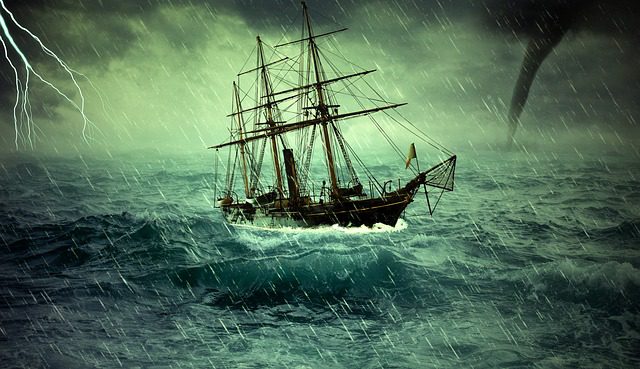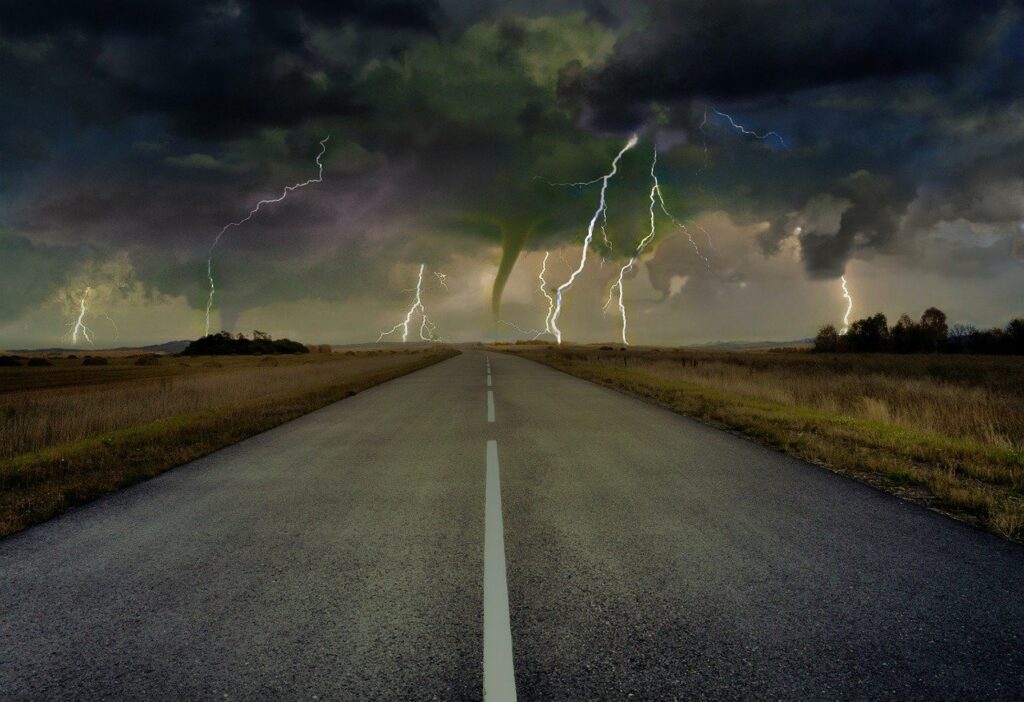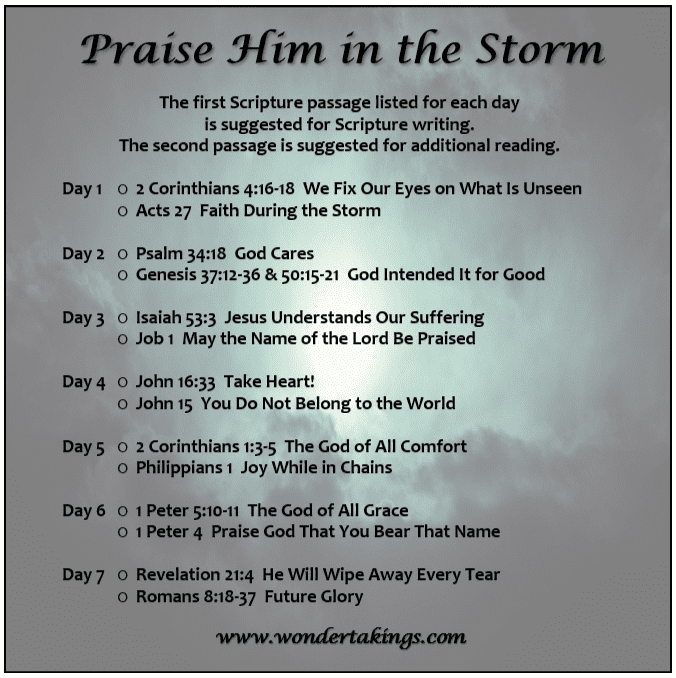Praise Him in the Storm
“We can rejoice, too, when we run into problems and trials, for we know that they are good for us — they help us learn to be patient. And patience develops strength of character in us and helps us trust God more each time we use it until finally our hope and faith are strong and steady.”
Romans 5:3-4 TLB

“When mariners describe a tempest that no sailor can escape, they call it a perfect storm. Not perfect in the sense of ideal, but perfect in the sense of combining factors. All the elements, such as hurricane-force winds plus a cold front plus a downpour of rain, work together to create the insurmountable disaster.”
Max Lucado, Anxious for Nothing
How do we praise God when we are in the middle of a perfect storm? How do we give thanks when we are dealing with one disaster after another? In other words . . . how in the world are we supposed to celebrate Thanksgiving in 2020? As Rev. Lucado points out, we can handle one problem, but two or three (or ten) at once is too much! Just when we emerge from one crashing wave of adversity and try to catch our breath, here comes another one to drag us back under. How do we survive with our faith and our sanity intact? Rev. Lucado directs us to Paul’s answer in Philippians:
“Do not be anxious about anything, but in every situation, by prayer and petition, with thanksgiving, present your requests to God. And the peace of God, which transcends all understanding, will guard your hearts and your minds in Christ Jesus.”
Philippians 4:6-7 NIV
With thanksgiving, present our requests to God, and God’s peace will guard our hearts and minds. Gratitude brings peace, and the peace of God will help us weather any storm. Max Lucado explains that when Paul wrote these verses, he had just survived a storm at sea. Paul was a prisoner and was being sent to Rome. During a dangerous winter voyage, the ship ran into a hurricane-force wind. The brutal storm dragged the ship along for fourteen days in unbearable conditions. The terrified crew gave up all hope of being rescued. But then Paul spoke up:
“Men, you should have taken my advice not to sail from Crete; then you would have spared yourselves this damage and loss. But now I urge you to keep up your courage, because not one of you will be lost; only the ship will be destroyed. Last night an angel of the God to whom I belong and whom I serve stood beside me and said, ‘Do not be afraid, Paul. You must stand trial before Caesar; and God has graciously given you the lives of all who sail with you.’ So keep up your courage, men, for I have faith in God that it will happen just as he told me.”
Acts 27:21-25 NIV
Rev. Lucado lists the elements of the perfect storm that Paul faced: “a winter sea”, “a ferocious wind”, “a cumbersome boat”, and “an impatient crew”. The crew gave up hope, but Paul did not. He had faith. His words to the frightened crew can speak to us as well when we’re in the middle of a perfect storm. Rev. Lucado tells us to look first at Paul’s rebuke and then at his promises. Paul began by telling the men they should have listened to him and they could have avoided this disaster. God tells us the same thing. When we get into trouble because we didn’t listen to His warnings, He may correct us. He does this for our good because He loves us and He wants what’s best for us. So if the storm we are in is of our own making, then we can confess our mistake and learn from it, resolving to do better next time. But we don’t need to despair. As Rev. Lucado explains, there are also three promises in this story:
- “Heaven has helpers to help you.” God sent an angel to Paul to comfort him and tell him not to be afraid. God still sends angels to help us, too.
- “Heaven has a place for you.” Paul described himself as belonging to God. As followers of Christ, we, too, belong to God. We are God’s children and He takes responsibility for us. We are not alone.
- “You are in the Lord’s service.” Paul still had a mission to complete, so he knew he would arrive safely in Rome. Rev. Lucado explains: “Most of us don’t have a clear message like Paul’s. But we do have the assurance that we will not live one day less than we are supposed to live. If God has work for you to do, he will keep you alive to do it.”
This doesn’t mean we won’t still face hardships. We will. But God is with us. He promises to give us the strength and courage we need to endure the storms of life. But we must hold on to Him. He is our anchor and our refuge. He will shelter us. And we must remember to give thanks for what we have. During their fourteen-day ordeal at sea, the men on Paul’s ship were too anxious (and probably too seasick) to eat. Finally, Paul encouraged them to take some food to keep up their strength: “After he said this, he took some bread and gave thanks to God in front of them all. Then he broke it and began to eat. They were all encouraged and ate some food themselves.” (Acts 27:35-36 NIV) Even with everything else going on around him, Paul took the time to give thanks to God. He had faith and he was at peace, and because of this he was able to bring some calm to others in the midst of the storm. We can do the same.
“You can lose it all, only to discover that you haven’t. God has been there all along. God has never promised a life with no storms. But he has promised to be there when we face them.”
Max Lucado, Anxious for Nothing

“In order to make sense of suffering, we have to view it from a long-term perspective. . . . Everything that happens to us in life — the pains, the pleasures, the joys, the miseries — all of it has to be viewed in the light of eternity. . . . The fact is that God can be tough. Yes, he loves us. But it’s not always a mushy, sappy love. Most times it’s a tough love. A very tough love. The love of a good, strong coach — or a good, strong father. What we have to understand is that God isn’t fooling around. Life is too short. Our enemies are too strong. Every day he tries his best to help us move a little closer to Heaven. And he’ll stop at nothing to achieve that goal. Nothing. There’s no cross too heavy that he won’t make us carry, no fire too intense that he won’t make us go through, if he knows the end result will be our salvation.”
Anthony DeStefano, The Invisible World
During the storms of life, we can face many trials and hardships. God promises to be with us and help us face them, but why doesn’t He just make them go away? Why do we have to suffer? Anthony DeStefano discusses the role suffering can play in our spiritual journey. God didn’t create suffering. It entered the world when sin entered the world. God created us to have free will because He wants us to choose to love Him freely and experience the joy and happiness our relationship with Him brings. Unfortunately, this means that humans can also choose to disobey Him. Mr. DeStefano points out that “death and disease and disorder entered the world because of a choice that Adam and Eve freely made in the Garden of Eden.” God doesn’t want us to suffer. He hurts when we hurt. But He won’t force us into a relationship with Him. As Mr. DeStefano explains: “The question from God’s point of view was, once human beings made the wrong choice and rebelled against him, what could he do to help us? How could he allow us to exercise free will but at the same time bear the disastrous consequences we automatically incurred? His solution, in a nutshell, was this: to permit suffering, but to transform it; to bring good out of it . . . .” He describes a story in the Gospels which illustrates this idea:
“It was late at night and the apostles were out on a little boat, crossing the Sea of Galilee to a place called Gennesaret. Jesus wasn’t with them — as usual he had stayed behind to pray. Anyway, it started to storm. The boat was tossed up and down on the waves, and it was thundering and raining and the wind was howling. Just then a bolt of lightning lit up the black sky, and the apostles saw, to their amazement, a man walking toward them on the water. They were terrified. They thought it was a ghost! Imagine how eerie the scene must have been, with darkness enveloping everything, and every few seconds flashes of lightning illuminating this ghastly white figure gliding slowly over the water, his robes blowing in the wind! Of course they were scared. It was like a scene out of a horror movie. But out of the darkness they suddenly heard the man on the water yell out to them: Take courage! It is I. Don’t be afraid. It was only then that they realized it was Jesus.”
Anthony DeStefano, The Invisible World
When the storms of darkness surround us and scary things are happening all around, we don’t have to be afraid. God is right there with us, right in the middle of it. He’s not the cause of the adversity, but He’s still in charge. He will take our troubles and use them to transform us. We may not be able to see the outcome, but God can. He knows everything about us, and He knows how to use whatever circumstances we are facing to help us get closer to Him. Remember that the goal of the Christian life is to become more like Christ. Christ suffered on the cross. We, too, have our own crosses to bear. Christ died and then was resurrected. We, too, must “die to ourselves” and then be “reborn” as new creatures. This means we must let go of our self-reliance and learn to depend on God. That’s the only way transformation can happen. We can’t do it ourselves. We have to let go and let God work in us through His Holy Spirit. Suffering is not fun, but it can make us realize what’s important. It can focus our attention on God in a way nothing else can. And once we turn to God, He can accomplish miraculous things in our lives. That’s been true for me. I’m willing to bet it’s true for you, too.
“Pain is the only thing that really has the power to disable that stubborn will; it’s the only thing that makes us realize how dependent upon God we truly are for every breath we take. The interesting thing is that when our self-reliance finally begins to die and we start relying on God, there’s no limit to the amazing kinds of feats we can perform.”
Anthony DeStefano, The Invisible World

“Then Job got up and tore his clothes in grief. He shaved his head and threw himself face downward on the ground. He said, ‘I was born with nothing, and I will die with nothing. The Lord gave, and now he has taken away. May his name be praised!'”
Job 1:20-21 GNT
If there was ever anyone who understood pain and suffering, it was Job. He was “blameless and upright,” but his whole world suddenly crumbled around him. He lost his house, his children, and even his health. He cried out to God. He didn’t understand why he had to face so many hardships. But did he blame God or turn away from him? No. He praised him! So how do we celebrate Thanksgiving in 2020? . . . By praising God no matter what we are facing. By receiving the peace that comes from giving thanks in all circumstances. By knowing God will be with us through all the storms of life. By letting God use our troubles to transform us and bring us closer to heaven. By learning to depend on God instead of ourselves. And by remembering that Jesus has already given us everything.
“If God never did anything else for you, he would still deserve your continual praise for the rest of your life because of what Jesus did for you on the cross. . . . Jesus gave up everything so you could have everything. He died so you could live forever. That alone is worthy of your continual thanks and praise. Never again should you wonder what you have to be thankful for.”
Rick Warren, The Purpose Driven Life
This week’s Scripture passages remind us to praise God no matter what storms we are facing. There is a printer-friendly pdf version below the image. I have also posted a video of “Praise You in This Storm” by Casting Crowns. This powerful song reminds us that our help comes from the Lord.

“For God has said, ‘I will never leave you; I will never abandon you.'”
Hebrews 13:5 GNT

References:
- “Casting Crowns – Praise You In This Storm (Live from YouTube Space New York).” YouTube, uploaded by Casting Crowns, 10 September 2019, youtu.be/MgpaULjZOl8.
- DeStefano, Anthony. The Invisible World: Understanding Angels, Demons, and the Spiritual Realities That Surround Us. Kindle ed., Doubleday, 2011.
- Lucado, Max. Anxious for Nothing: Finding Calm in a Chaotic World. Thomas Nelson, 2017.
- Warren, Rick. The Purpose Driven Life: What on Earth Am I Here For? Zondervan, 2002.
Images:
- Storm Tree featured image by My pictures are CC0. When doing composings: from Pixabay
- Ship in Stormy Sea image by Lothar Dieterich from Pixabay
- Stormy Road image by J Byers from Pixabay
- Man on Water image by StockSnap from Pixabay
- Sunset Beach image by kordula vahle from Pixabay
Thank you for this Thanksgiving advice. You made me appreciate all the more that God is standing by to help us, always.